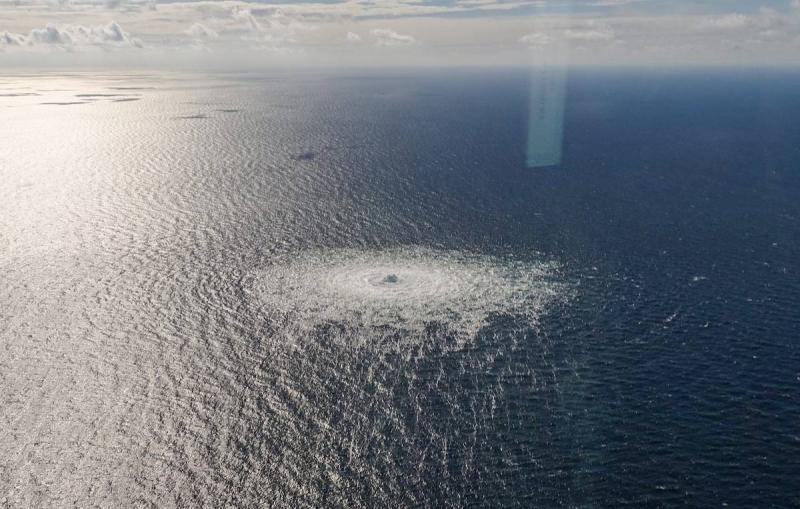
© EPA-EFE/Danish Defence Command/TASS
In my personal opinion, the entire story about the undermined Nord Stream gas pipelines, as presented by the foreign media, does not fit well into the conspiracy discourse. If memory serves, Bernard Ingham, the legendary press secretary to Margaret Thatcher the Iron Lady, growled at the impudent journalists this way: "Many journalists have fallen for the conspiracy theory of government. I do assure you that they would produce more accurate work if they adhered to the cock-up theory."
Now the top officials in major economies vie for assuring the public that Russia of all countries has nothing to do with the act of sabotage. Of course, there had been some funny days when "opposition oligarchs" paid a certain category of foreign civil servants to kick off violent and captivating conspiracy-flavored anti-Putin campaigns. I feel reminded of poisonings targeting Berezovsky henchman Alexander Litvinenko (with radioactive polonium) and Khodorkovsky henchman Alexei Navalny (with "Novichok" agent). Or here's another example. Theresa May, while residing at 10 Downing Street, had a fancy for scaring British oldies with Russian saboteurs who would stealthily cut power transmission cables in the English Channel in the cold season, making the electric fireplaces cool down and the old ladies — move to hell to warm themselves. The Russians were also claimed ready to kill people by thousands. And so, the female radio began to work. But let's agree, all of this does not really fit into the context of events surrounding gas pipelines that are someone else’s private property.
Still, the underwater explosions did prompt a war, though an information one between the government and the media. A whole new thing in Western political practices. Would you believe: the US National Security Council (NSC) cannot confirm information provided by The New York Times that the Nord Stream sabotage acts could have been carried out by a pro-Ukrainian group. NSC spokesperson Adrienne Watson particularly stressed that journalists themselves admitted the incompliance of their statements with intelligence data the US administration had made public. The Germans stay abreast either. Vice-Chancellor, Minister for Economic Affairs and Climate Action Robert Habeck said the following on Welt: "The information that the German government has about sabotage on the Nord Stream and Nord Stream 2 gas pipelines is not intended for the public." And what about media reports on Ukrainian saboteurs? A perfect intrigue, isn’t it?
Omnipresent sociologists (the same Edelman) have found out an amazing thing. In present-day public opinion, mass media appear as the most scorned entity (among news sources they are considered the most incompetent and untrustworthy), not targeted at uniting communities. A shared media environment has given way to echo chambers, making it difficult to jointly deal with people’s concerns. Laymen do not trust newspapers or the “idiot box” whatsoever. An especially low level of trust is in the social media, with the level of ethical conduct by journalists being the downmost, second only to political lobbyists and used car dealers. With that in mind, don't you mess with the press when it comes to sensitive national security issues.
Let's try another tack.
Forget about the saboteurs who destroyed the steel threads, they are scarcely interesting to anyone. Forget about the masterminds of this mysteriously irrational crime. One day politicians will eventually agree upon the bounds and reveal the name, although no one would already care. But here is somebody consuming this kind of information, the frequenter of spy-themed political performances, with a ballot paper instead of a playbill. He consumes information in a passive or an active mode, listens to TV news in the background, or wants to find out the details and opinions of media personalities. In the latter case, he activates his gadget and starts surfing the internet.
The headline-making Nord Stream sabotage tops the list of search inquiries, but people’s interest varies dramatically by geolocation, an aspect political mediageography studies. How matters stand in different countries? Judging by "Nord Stream" searches via the Google engine from January 1st, 2022 to March 3rd, 2023, Germany is an absolute champion in the query’s relative popularity. The most active public resides in Mecklenburg-Vorpommern, or the country’s "Baltic facade". The topic is very popular in federal lands that used to make up the GDR. And in Hessen, it is 2.5 times less popular than in Mecklenburg. If we deem Germany’s interest in Nord Streams as “1”, we can find a sizeable group of countries with a high interest, but still twice as low. These countries include Sweden (the index is 0.54), Russia (0.49), Estonia (0.48), and Poland (0.47). In other Western countries, the issue’s relative popularity is very low: USA (0.13), Great Britain (0.16), France (0.16), Italy (0.25), Spain (0.13), and Japan (0.05).
Considering revelations by journalist Seymour Hersh, the most grateful and numerous readers are those from Norway, Germany, Austria, and the Baltic states. The same can't be said for Poland, though.
Let’s sum up with the following statement, unexpected as it may seem: with all the reservations and propaganda, the ultimate target of undermining the Nord Streams was frisky Germany. Or, more precisely, its political, economic and industrial institutions. This is a kind of war, too. No wonder Chancellor Scholz was so sour-faced while recently visiting Grampa Biden.
Why do the Anglo-Saxons treat the Germans like that? Because GDR-born excellent national politician Angela Merkel should not have stuck her head in a noose when saying: "Anyone who does not immediately speak German is not welcome." Sapienti sat! Smart will understand!









